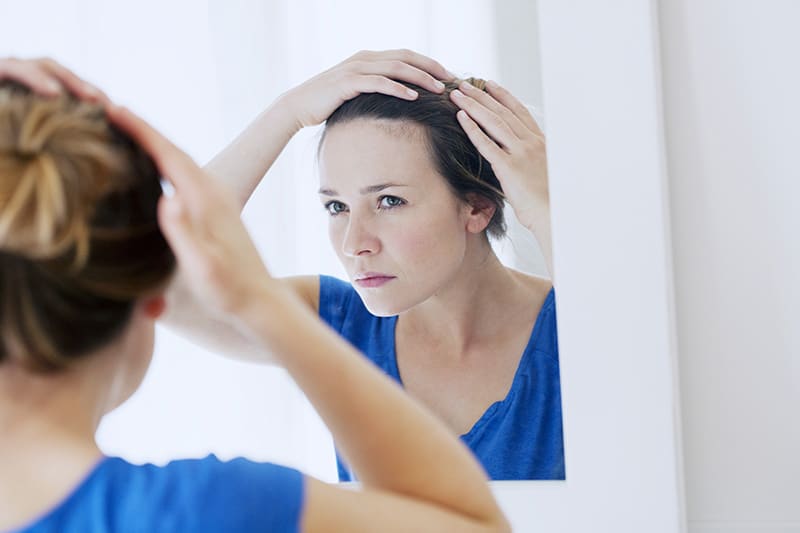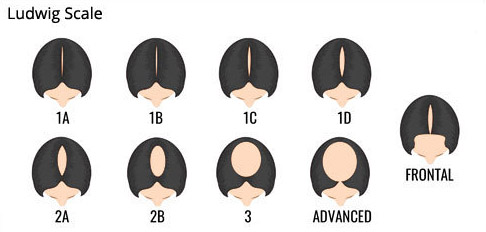Female Hair Loss
When looking at the effects of hair loss in women, it’s not uncommon to see women suffer mentally as they are likely to develop negative body image because of it. Hair is mostly linked to beauty, youth, sexuality, and sensuality in women and losing it may make someone feel less beautiful.
But after the FUE hair transplant procedure women are able to regain their sense of beauty and youth. They finally start feeling attractive which makes them more open to creating new relationships or even maintaining the ones they currently have!
Women with hair loss have an increased prevalence of psychological disorders including depression, anxiety, social phobia, and paranoid disorders. So it’s common to see them become less social overtime because of their lack of confidence in themselves. And this poses a big problem because they may not be able to sustain their current relationships, create new ones, or even find a life partner which can all contribute to their feelings of depression or anxiety.
 Causes of Female Hair Loss
Causes of Female Hair Loss
Unlike hair loss in men, female scalp hair loss may commonly begin at any age through 50 or later, may not have any obvious hereditary association. A woman who notices the beginning of hair loss may not be sure if the loss is going to be temporary or permanent-for example, if there has been a recent event such as pregnancy or illness that may be associated with temporary hair thinning.
Self-diagnosis is often ineffective. Women tend to have less obvious patterns of hair loss than men, and non-pattern types of hair loss are more frequent in women than in men. Diagnosis of hair loss in a woman should be made by a trained and experienced physician.
In women as in men, the most likely cause of scalp hair loss is androgenetic alopecia-an inherited sensitivity to the effects of androgens (male hormones) on scalp hair follicles. However, women with hair loss due to this cause usually do not develop true baldness in the patterns that occur in men-female hair loss occurs in various patterns and is often diffuse or veiled vs bald. Patterns of female androgenetic alopecia can vary considerably in appearance.
Female hair loss is a common problem that affects many women at some point in their lives. There are several factors that can cause hair loss in women, including genetics, hormonal changes, medical conditions, stress, and certain hairstyles and treatments.

Types of Female Hair Loss
- Androgenetic Alopecia
Also known as female pattern hair loss, is the most common type of hair loss in women. It is caused by a combination of genetic and hormonal factors, and can cause a gradual thinning of the hair on the scalp. - Telogen Effluvium
is another common type of hair loss in women that can be triggered by stress, pregnancy, a severe illness, or changes in hormone levels. It causes an increase in the number of hair follicles that enter the telogen, or resting, phase and results in a sudden shedding of hair. - Alopecia Areata
is an autoimmune disorder that causes patchy hair loss on the scalp, as well as other areas of the body. It occurs when the immune system attacks hair follicles, causing them to shrink and stop producing new hair. - Medical Conditions
Thyroid disease, iron-deficiency anemia, and polycystic ovary syndrome (PCOS), can also cause hair loss in women. Certain medications, such as those used to treat cancer and depression, can also cause hair loss as a side effect. - Stress
Stress can also play a role in female hair loss. When a woman experiences high levels of stress, it can cause a type of hair loss called telogen effluvium. During this type of hair loss, hair follicles enter the resting phase and hair falls out more easily. - Hairstyles and Treatments
Tight braids, weaves, and chemical treatments, can also contribute to hair loss in women. Wearing tight hairstyles that pull on the hair can cause traction alopecia, which is a form of hair loss caused by damage to the hair follicles. Chemical treatments, such as bleach and relaxers, can also damage the hair and cause it to break and fall out.
Treaments for Hair Loss in Women
There are several options for treating female hair loss, they include FDA approved topical treatment with Rogaine for Women. Rogaine, also know as minoxidil, is applied directly to the scalp on a daily basis. For some women with regular daily use the thinning areas will not only maintain existing hair but thicken the hair. This positive result will cease if Rogaine is discontinued.
Follicular Unit Transplantation (FUT) and Follicular Unit Extraction (FUE) is the surgical relocation of healthy hair follicles from the sides and back of the head to the thinning areas. Although transplanted hair will continue to grow it may be a necessity for additional hair transplantation if you lose more hair. Some patient’s combine hair transplantation with Rogaine treatment. Hair transplantation can also be performed to replace hair loss of the eyebrows.
Hair Thickening Cosmetics and Hair Additions are effective but temporary treatments that can artificially camouflage hair loss. Hair Thickening products include natural keratin fibers that can be shaken into the hair to fill gaps in your hair. Hair coloring sprays and makeups also camouflage hair loss effectively in some cases. Hair wefts and wigs conceal hair loss while worn.
